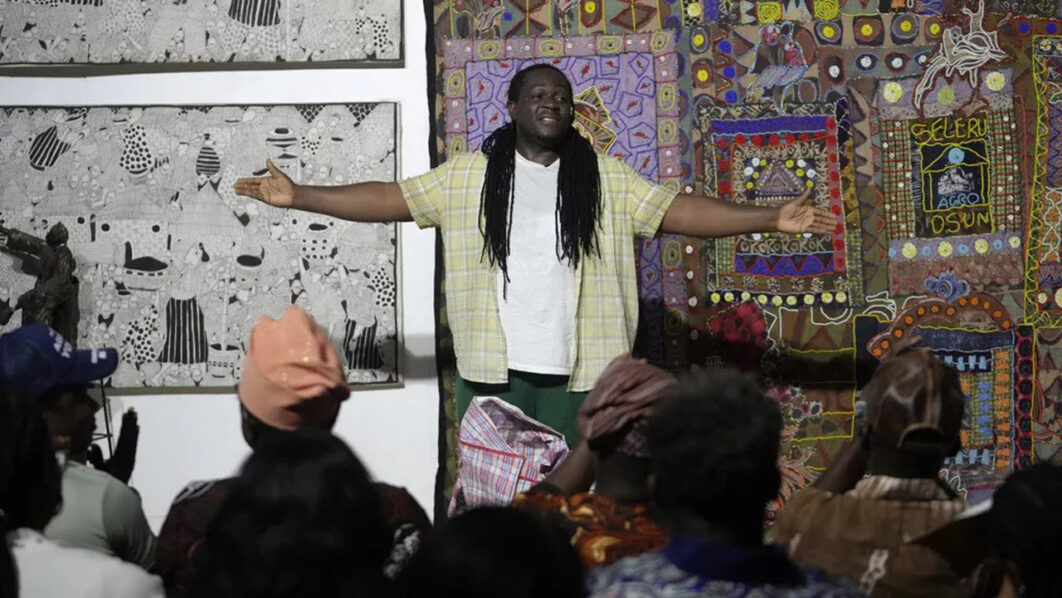
The classical definition of comedy is seen as a genre of dramatic performance having a light or humorous tone that depicts amusing incidents and in which the characters ultimately triumph over adversity.
Aristotle, in his Poetics, defines comedy as representing human beings as ‘worse than they are’; however, he notes that comic characters are not necessarily evil, but just ridiculous and laughable.
In the one man play, Iloya, created by Nigerian-born, Cape Town-based artiste, Segun Lafup Ogundipe, there is an attempt to make comedy cry. Though the play appears a Cavalcade of comedies, there is much tragedy than comedy.
The performance — starring Segun Lafup Ogundipe as Makan — depicts a heart-wrenching tale of a brilliant young Nigerian, a first-class graduate of petrochemical engineering, who had to contend with challenges facing contemporary Nigeria — from job crisis to housing shortages — in the fast-paced city of Lagos.
He has used the role of Makan to redefine what tragedy is. His character, Makan, like Willy Loman, suffers hubris as result of his fabricated version of success, and unwilling to accept help from others.
The performance reaches an emotional crescendo with poignant songs for every trajectory, reminding the audience that despite the pains of the moment, there is much to laugh about.
After securing a banking job in Lagos, Makan invites his girlfriend, Shade, to join him, only for her to betray his trust in ways that shatter his spirit.
Lost in the chaotic fast life of Lagos, he is conned repeatedly, and joined the ‘japa’rush – searching for the proverbial greener pasture in Europe.
In a twist of fate, the protagonist eventually lands in the UK, where he discovers that his dreams could have been realised at home. As a letter from multinational company, Shell, offering him his dream job, was hidden by shade.
And as Miller revised the classical Aristotelian tragedy to create a modern-day tragedy, so, has Ogundipe. Like Willy Loman, an ordinary man who struggles with life, Makan cries out against tragic issues that threaten his life. Iloya, return home, in Yoruba, is the clarion call for Nigerians to Japada.
The term Japa is one of the most popular words in Nigeria after Nollywood. It identifies youth search for new identity. Applied loosely, Japa means ‘run away’. But what are they running away from and what new identity are they craving?
The plays tragedy is woven from Japa, which began as brain drain in the mid-80s when intellectuals fled the country because of the ‘draconian’ policies of government, and the subsequent Structural Adjustment Programme (SAP) and the Second Tier Foreign Market (SFEM), which killed the Nairs.
Not necessarily an ‘intellectual revolution’, which it was known in the 80s and 90s, the second era of Japa is a bye-word for discontentment, as angry youths all over the country are responding to economic dislocation, the chicanery of barbarity of political elite, the sole orchestrators of poverty in the land, and their ally in the religious space, who true their profanity voices, swindle innocent folks.
The play, Iloya, deals really about economic struggle, brain drain, and the constant journey to discovering self in the most unusual way. Having to adapt with all situation and finally saying, ‘You know what? I’ve had enough.’
What makes this really different is that a lot of the people are even investing, taking loans from bank just to relocate. With curatorial assistance from Katiego Chale of Western Cape University and directorial input from Mojisola Kareem, the play made its debut in South Africa, then United Kingdom before coming home to Nigeria for a homecoming performance and setting what would be a cause for discussion in days to come because of theme and treatment.






